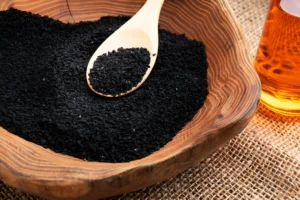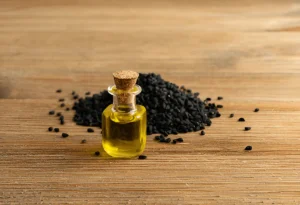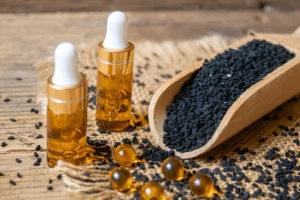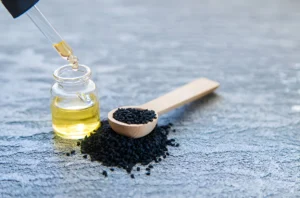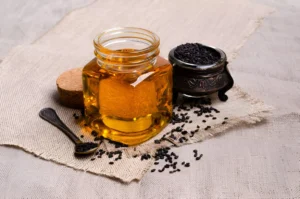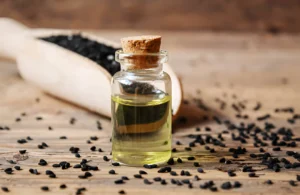 black seed oil and diverticulitis
black seed oil and diverticulitis
Pathophysiology of Diverticulitis and Implications for Gut Health
Diverticulitis is an inflammatory or infected process of diverticula that have been formed by increased intraluminal pressure and by the presence of weak points in the colonic wall. Risk factors include decreased dietary fiber intake, change in gut microbiota, genetic predisposition, and chronic low-grade inflammation. In severe cases, complications might arise, including abscess formation, perforations, and intestinal obstructions. Restoration of gut homeostasis is a core component in the management of diverticulitis. These would include modulating inflammation, enhancing microbial balance, and protecting intestinal integrity. Black seed oil fits well into this goal of therapy because of its rich bioactive composition.
Therapeutic Potential of Black Cumin Seed Oil for Diverticulitis Management
Black seed oil has been highly researched for its medicinal properties, which are mainly attributed to its bioactive compound, thymoquinone. The pharmacological profile of black seed oil provides a multi-dimensional approach to address the pathophysiological mechanisms of diverticulitis.
Modulation of Inflammatory Pathways
Black seed oil exerts anti-inflammatory effects by interacting with core signaling pathways in thymoquinone, thereby affecting the progression of diversionitis through interactions with major pathways such as nuclear factor kappa-light-chain-enhancer of activated B cells and cyclooxygenase. IL-6, one pro-inflammatory cytokine of inflammation cascades, could be targeted by black seed oil that has been documented to limit TNF-alpha’s exacerbation of the inflammatory condition experienced by diverticulitis patients. Chronic inflammation can be particularly destructive because it may compromise the structural integrity of the wall of the colon over time. Regular use of black seed oil for diverticulitis can potentially reverse these effects, providing long-term benefits in maintaining gut health.
Combating Infections
Infections caused by pathogenic bacteria within the diverticula are a common trigger for diverticulitis flare-ups. Black seed oil exhibits broad-spectrum antimicrobial activity, effectively targeting Gram-positive and Gram-negative bacteria. Its selective antimicrobial action preserves commensal gut flora, a critical factor in maintaining gastrointestinal homeostasis. The antimicrobial effects of black seed oil extend to fungi and viruses, offering additional protective benefits for overall intestinal health. By controlling microbial imbalances, black seed oil aids in reducing the risk of recurrent infections.
Gut Microbiota Modulation
Gut microbiota imbalances, or dysbiosis, are frequently observed in diverticulitis. Black seed oil fosters a healthier gut environment by suppressing pathogenic bacteria and encouraging the growth of beneficial strains such as Lactobacillus and Bifidobacterium. By restoring a balanced microbial ecosystem, black seed oil improves digestion and nutrient absorption and strengthens immune defenses. This regulation reduces the risk of recurrent diverticulitis episodes, offering long-term support for gut health. Balanced gut microbiota play a key role in regulating inflammatory responses. Black seed oil’s ability to reduce dysbiosis contributes to overall gastrointestinal stability, reducing symptoms like bloating and irregular bowel movements.
Antioxidant Activity and Oxidative Stress Mitigation
Oxidative stress contributes to the progression of diverticulitis by damaging intestinal tissues. The potent antioxidant properties of black seed oil neutralize reactive oxygen species (ROS), thereby protecting the intestinal mucosa and promoting recovery during flare-ups. Thymoquinone, in particular, has been shown to enhance the activity of endogenous antioxidant enzymes such as superoxide dismutase (SOD) and glutathione peroxidase (GPx). This action reduces oxidative damage, fostering an environment conducive to tissue repair and healing.
Intestinal Barrier Support
The intestinal barrier is critical for preventing bacterial translocation, a common issue in severe diverticulitis cases. Thymoquinone, a key component of black seed oil, promotes epithelial barrier integrity by reducing intestinal permeability. This enhanced barrier function prevents harmful bacteria and toxins from entering the bloodstream, lowering the risk of systemic inflammation. Improved intestinal barrier strength minimizes complications such as abscesses and perforations. By reinforcing this protective mechanism, black seed oil provides a preventive approach to managing diverticulitis, especially in recurrent or severe cases.
Pain and Discomfort Relief
The antispasmodic properties of black seed oil play a significant role in managing the abdominal pain and discomfort associated with diverticulitis. By relaxing the intestinal muscles, black seed oil alleviates cramps and reduces the intensity of painful episodes. Its effect on bloating and irregular bowel habits enhances overall symptom relief. Black seed oil’s calming effects on the gastrointestinal tract may improve motility, reducing the risk of constipation or diarrhea. This comprehensive symptom management makes it a valuable natural remedy for those seeking holistic relief. black seed oil diverticulitis
black seed oil diverticulitis
Black Seed Oil Diverticulitis Treatment Methods
Black seed oil offers various methods of administration that can help manage the symptoms of diverticulitis. Its anti-inflammatory and healing properties make it an effective natural remedy for digestive discomfort. Below are some common ways to incorporate black seed oil into your treatment plan:
|
Method |
Description |
|
Oral Administration |
Oral consumption is the most common method of using black seed oil for diverticulitis. The recommended dosage involves taking 1–2 teaspoons of cold-pressed black seed oil daily. Administering it with meals enhances its absorption and minimizes gastrointestinal irritation. This method is highly effective for individuals looking to experience the full systemic benefits of black seed oil and diverticulitis, including its anti-inflammatory and antimicrobial effects on the gut. |
|
Topical Application |
Topical application of diluted black seed oil on the abdominal area may provide localized relief by promoting relaxation of the intestinal muscles. This approach can help reduce abdominal cramps and discomfort commonly associated with diverticulitis flare-ups. Using black cumin seed oil for diverticulitis in this way can complement oral supplementation, enhancing overall symptom management. |
|
Combining with Herbal Teas |
Black seed oil can be mixed with herbal teas known for their digestive benefits, such as chamomile or peppermint tea. This combination enhances the therapeutic effects, providing both anti-inflammatory and calming properties to soothe the gut. The soothing properties of herbal teas work synergistically with black seed oil and diverticulitis, supporting digestion and easing gastrointestinal discomfort, making it an ideal remedy for relief. |
|
Smoothies and Functional Beverages |
Black seed oil can be seamlessly integrated into smoothies or functional beverages. Pairing it with gut-friendly ingredients like bananas, ginger, and honey amplifies its therapeutic benefits. This method makes it easier for individuals to consume black seed oil good for diverticulitis regularly, adding extra nutrients that support overall digestive health and immune function. |
|
Culinary Use |
Black seed oil can serve as a base for salad dressings when blended with olive oil, lemon juice, and herbs. This application ensures its regular consumption without altering dietary routines significantly. Using black seed oil for diverticulitis in culinary recipes adds a flavorful yet health-boosting element to meals, promoting gut health and enhancing the nutritional value of everyday dishes. |
|
Capsule Formulations |
For individuals averse to its taste, black seed oil is available in encapsulated forms. These provide a precise dosage and convenience, ensuring consistent intake without the need for measuring or tasting the oil. Capsule formulations of black seed oil are ideal for those looking for a simple, convenient way to incorporate black seed oil good for diverticulitis into their routine, benefiting from its therapeutic properties. |
Black Cumin Seed Oil and Gut Microbiota Modulation
Gut microbiota dysbiosis is increasingly recognized as a contributing factor to diverticulitis. Black cumin seed oil supports microbial balance by suppressing pathogenic bacteria and fostering the growth of beneficial strains. Its anti-inflammatory properties create an environment conducive to microbial diversity, which is essential for long-term gut health. Regular supplementation with black cumin seed oil may reduce markers of dysbiosis, such as an overgrowth of harmful bacteria or reduced levels of beneficial species like Lactobacillus and Bifidobacterium. This rebalancing promotes improved digestion, enhanced nutrient absorption, and a strengthened immune response.
Scientific Insights on Black Seed Oil and Diverticulitis
Numerous studies highlight the therapeutic potential of black seed oil for gastrointestinal health:
- Inflammatory Biomarker Reduction: Clinical trials have demonstrated that black seed oil lowers levels of C-reactive protein (CRP) and other inflammatory markers, directly addressing chronic inflammation in diverticulitis. A study published in the Journal of Ethnopharmacology confirmed the efficacy of black seed oil in reducing systemic inflammation, providing a basis for its use in inflammatory gastrointestinal disorders.
- Gut Flora Restoration: Research indicates that black seed oil fosters microbial diversity, essential for preventing dysbiosis-related complications. Findings in the World Journal of Gastroenterology highlight that black seed oil supplementation supports a balanced gut flora, promoting the proliferation of beneficial bacteria like Lactobacillus.
- Oxidative Stress Mitigation: The antioxidant activity of black seed oil reduces oxidative damage, aiding in tissue repair and preventing recurrent episodes. A 2020 study in Antioxidants demonstrated the protective effects of thymoquinone against reactive oxygen species, underscoring its role in intestinal health.
- Epithelial Barrier Function: Thymoquinone’s ability to enhance intestinal barrier integrity protects against bacterial translocation, a major risk factor in severe cases. Research in the International Journal of Molecular Sciences showed that thymoquinone restores tight junction proteins, crucial for maintaining gut barrier function and preventing systemic infections.
Safety Profile and Considerations
Black seed oil is generally well-tolerated, but excessive doses can lead to gastrointestinal discomfort. People taking anticoagulant medications or those with chronic conditions should consult their healthcare provider before use. Pregnant or lactating individuals should also seek professional advice to ensure safety. It is important to note that black seed oil should complement, not replace, conventional medical treatments for diverticulitis. Working closely with healthcare providers ensures the best approach for managing the condition and optimizing overall health outcomes.
Key Takeaways
Black seed oil and diverticulitis management offer a promising natural remedy to enhance gut health and alleviate symptoms associated with this condition. With its anti-inflammatory, antimicrobial, and antioxidant properties, black seed oil for diverticulitis addresses the underlying causes of inflammation, infections, and oxidative stress that exacerbate flare-ups. The ability of black cumin seed oil for diverticulitis to restore gut microbiota balance and reinforce the intestinal barrier makes it an essential addition to holistic gastrointestinal care. By incorporating black seed oil good for diverticulitis into your daily routine through oral consumption, topical application, or culinary use, you can support digestion, reduce abdominal discomfort, and prevent recurrent episodes. As a natural, scientifically-backed solution, black seed oil diverticulitis treatment complements conventional therapies, offering a comprehensive approach to maintaining long-term gut health and improving overall quality of life. Always consult with a healthcare provider to tailor its use to your specific needs.


